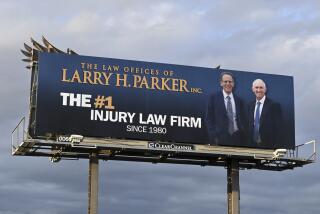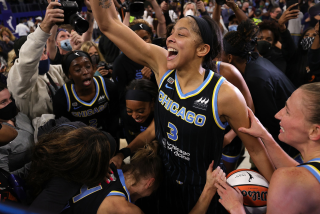Col. Parker Dies; He Made Elvis a Star
Don’t expect history to be kind to Col. Tom Parker, who died of complications of a stroke Tuesday in Las Vegas at age 87.
The cagey ex-carnival pitchman who helped turn a raw Elvis Presley into the biggest star ever in pop music probably will stand for generations to come as a symbol of the exploitation and greed in the continuing battle between commerce and art.
His critics will point to the high management fees Parker charged--as much as 50% at one point--and to the way he seemed to do so little to prevent Presley’s sad, drug-related decline and ultimate death in the 1970s.
But without Parker, neither Presley nor rock ‘n’ roll would have been the same. Indeed, in some ways, Parker--a man who was equal parts mystery and legend--actually may be the more compelling story.
On his own, Presley may never have been more than another of the talented, energetic figures who gave birth to rock ‘n’ roll in the 1950s, only to see the stage taken away from them by the Beatles and the rest of the ‘60s rock contingent.
It was Parker’s packaging and marketing savvy that helped Presley maximize his stardom--even though Parker never understood or particularly valued Presley’s immense talent.
Parker and Presley ultimately were a team that overcame the prejudices of the adult and pop music establishments, and turned rock ‘n’ roll from an outcast into a cornerstone of 20th century pop culture--with Presley as its king.
During his life, Parker was as private as Presley. There even was debate over his birthplace. Although he claimed that he was born in Charleston, W. Va., it now is generally believed that he was born Andreas Cornelius van Kuijk in Breda, the Netherlands, and immigrated to this country illegally aboard a freighter in 1929.
One reason Presley never toured overseas reportedly is that Parker did not want to risk going through customs. His Dutch family would not hear of him again until they saw a photo of Parker and Presley in a magazine in 1961.
By the time he came across Presley in 1955, Parker had founded and nationally toured with the Great Parker Pony Circus and Col. Tom Parker and His Dancing Chickens--which “danced” when he placed them on a hot plate. More important, he managed such country stars as Eddy Arnold and Hank Snow.
(The honorary title of “Colonel” was bestowed on Parker in 1948 by Gov. Jimmie Davis of Louisiana.)
He was on the hunt for new talent, someone who would take him beyond the confines of country music, when he heard about a handsome 20-year-old named Elvis Presley who was causing a stir in the South on tiny Sun Records out of Memphis, Tenn.
When Parker went to a concert to see Presley, he didn’t listen to what was coming from the stage. He heard the shrieks of the teenage fans. He then moved in with the smoothness of a military campaigner, taking over as Presley’s manager and then getting Presley off Sun Records, where his talent had been nurtured by owner-producer Sam Phillips.
Knowing that Phillips was in debt, Parker convinced RCA to pay Sun $35,000--a record sum at the time--for Presley’s contract. He then got Presley a series of appearances on national television, and Presley did the rest.
Having no faith that rock ‘n’ would last as a commercial force, Parker quickly moved Presley into movies, where the young star was saddled with horrible scripts and songs.
Phillips once expressed the resentment that millions of Presley fans felt toward the Hollywood years: “The great disappointment . . . was they put out such trash on this man--all those soundtrack albums. It just crushed me to see a talent go to waste like that.”
But Parker scoffed at critics of the films, pointing out that Presley was getting $1 million a picture--more at the time than most established film stars.
Finally, however, Presley rebelled. He stopped taking songs only from publishers who had business ties to Parker and himself, and he reached out to other writers. The result was a return to creative form--and to the Top 10--with such hits as “Burning Love,” “Suspicious Minds” and “In the Ghetto.”
Confident again, Presley, who hadn’t toured in years, demanded to go back on stage where he could feel the thrill of the crowd.
And again, Parker guided him brilliantly.
Instead of simply returning to the conventional concert trail, Parker whet the public’s appetite by opening Presley in Las Vegas in 1968. Presley outdrew everyone who ever had played the Strip, from Frank Sinatra to Barbra Streisand. Then, Parker sent him on tour.
Even if Parker saw the toll that the grueling concert pace was taking on Presley, he may have been incapable of stopping it. Presley’s lifestyle was extravagant by the early 1970s, and he needed the money.
If Parker was the villain, Presley was his accomplice.
Still, in a legal battle over the Presley estate in 1981, one document presented to the judge described Parker as “a money-grubbing tightwad who cheated Presley out of millions” by engaging in secret deals and taking up to 50% of the singer’s income during his lifetime and for years after his death.
Two years later in a settlement that ended the dispute, Parker got more than $2.2 million in exchange for dropping all claims to the estate.
His first wife, Marie, whom Presley called “aunt,” died in 1980. Parker is survived by his second wife, Loanne, whom he married in 1989.
Private services will be held Saturday at 2:30 p.m. at the Las Vegas Hilton.
Although he claimed he was “semiretired, but involved in promotion work for one of the major hotels” in Las Vegas, Parker’s world pretty much ended with Presley’s death.
He did occasionally see representatives from RCA and the William Morris Agency, which managed his affairs and his money. But he remained private. He turned down countless offers to write a book about his experiences with Presley (“You know what they want--dirt,” he told Variety in 1994. “I’m not a dirt farmer”). He also rejected interviews.
“He remained very articulate, his mind was as sharp as when I met him in 1968,” said Bruce Banke, the former director of publicity at the Las Vegas Hilton who said he visited Parker every couple of weeks in recent years. “He was usually in good spirits,” Banke said Tuesday, “talking about the carnival days, the Eddy Arnold days, the Elvis days. I just wish I had a microphone so I could have recorded it all. But it’s gone now.”
Even during Presley’s stardom, Parker rarely spoke to the press. But his name has become synonymous with power and accomplishment in pop music, more so even than Brian Epstein, who guided the Beatles during the early stages of their career.
In a meeting with record executives in the 1980s, Michael Jackson--perhaps the only post-’50s pop star to approach Presley’s fame--joked when the executives weren’t responding enough to one of his requests.
“Should I bring in Col. Parker?,” Jackson asked with a shy grin.
The first time this reviewer met Parker was in the early 1970s when I was reviewing a Presley concert in Las Vegas. After the show, Parker walked up and asked, “Do you want to meet the boy?”
But on the way to the dressing room, he made it clear that this was just to be a social call, not an interview. “Howard Hughes doesn’t give interviews, which is why everyone wants to know about him. There’s no substitute for mystery.”
The next time I saw Parker was in 1978, a year after Presley’s death, at an “Always Elvis” convention at the Las Vegas Hilton. This time, he was a little more open.
Throughout the day, fans stood sometimes 10 and 20 deep to shake Parker’s hand.
The old man knew he was just a stand-in for his former star, but he appeared touched by the attention. He missed Presley more than he would admit, friends said. Theirs had been a father-son relationship, complete with the ups and downs in such bondings.
“We made a hell of a team,” he said after the crowd had cleared and he was sure his remarks would be off the record. “I thought we’d go on forever, but . . .”
He stared out into the distance, leaning on the cane he carried in later years and pausing as if trying to figure out what more to say.
“Sure,” he said, softly, answering a question that hadn’t been asked. “Sure, I loved him.”
Times staff writer Myrna Oliver contributed to this story.
More to Read
The biggest entertainment stories
Get our big stories about Hollywood, film, television, music, arts, culture and more right in your inbox as soon as they publish.
You may occasionally receive promotional content from the Los Angeles Times.










